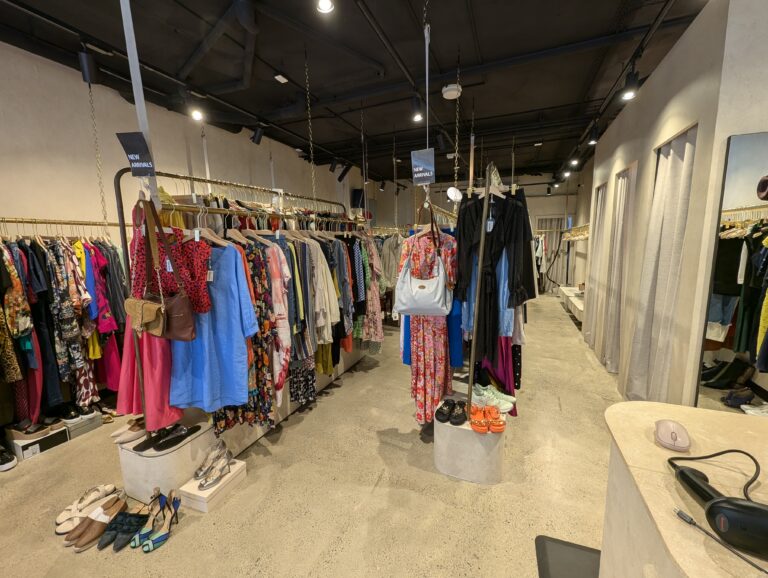WHY CONSIGNMENT AND RENT‑A‑RACK ARE THE FUTURE
In recent years, the fashion world has undergone a fundamental shift. As consumers become more conscious of their environmental impact and purchasing habits, one thing has become clear: sustainability is no longer a trend—it’s a movement. And at the heart of this movement lies a powerful yet often overlooked player: consignment stores.
These local, community-driven retailers—and increasingly, rent-a-rack spaces—have become champions of circular fashion, giving clothes a second (or third) life while reducing the environmental toll of fast fashion. As awareness grows and priorities shift, consignment stores are stepping into the spotlight—and they might just be the future of fashion retail.
THE ENVIRONMENTAL COST OF FAST FASHION
To understand the appeal of consignment stores, it’s important to first examine what’s broken in the traditional fashion industry. Fast fashion—characterised by cheap, disposable clothing produced at breakneck speed—has fuelled excessive consumption over the past two decades. The average consumer now buys 60% more clothing than they did 15 years ago, but keeps each item for only half as long.
The result? A staggering amount of textile waste. According to the Environmental Protection Agency (EPA), over 11 million tonnes of textile waste end up in U.S. landfills every year. Beyond waste, the fashion industry is one of the largest contributors to global carbon emissions, water pollution, and exploitative labour conditions.
In contrast, consignment and rent-a-rack stores promote reuse, reduce demand for new production, and help extend the lifecycle of clothing—an essential pivot in our journey towards sustainable fashion.
WHAT IS A CONSIGNMENT STORE?
A consignment store is a retail business where individuals can sell their gently used clothing, shoes, and accessories. The store sells these items on behalf of the original owner and splits the sale price, either through a percentage-based commission or store credit. Rent-a-rack models provide a similar setup, allowing clients to hire space in a store and manage their own mini-boutique, with staff facilitating the sales.
The beauty of this model is that it benefits all parties involved:
Sellers (or clients) earn money or store credit for items they no longer wear.
Buyers gain access to high-quality, often designer goods at a fraction of the original price.
The planet benefits through reduced waste and a lighter environmental footprint.
Consignment shopping is smart, ethical, and increasingly stylish. It’s also reshaping the way we define “new” in fashion.

WHY MILLENNIALS AND GEN Z ARE LEADING THE CHARGE
Younger generations are a driving force behind the consignment boom. Studies show that Millennials and Gen Z consumers are more likely than any previous generation to buy secondhand clothing. They value authenticity, sustainability, and affordability—three traits that consignment and rent-a-rack stores deliver in spades.
This demographic is also digitally savvy, turning to resale platforms like Depop and Vinted. But while online resale has seen meteoric growth, local consignment and rent-a-rack stores remain essential. They offer tangible experiences, personalised service, and the joy of in-person discovery—something algorithms can’t replicate.
Brick-and-mortar stores often partner with community causes, support local economies, and curate inventory with intention. For conscious consumers, shopping secondhand has become a lifestyle rather than a compromise.
QUALITY OVER QUANTITY
In a world addicted to speed and volume, consignment and rent-a-rack stores encourage the opposite: intentional consumption. They offer shoppers the opportunity to invest in better-quality garments that stand the test of time, rather than disposable trends destined for landfill.
Because these stores typically accept only gently used or high-quality items, shoppers are more likely to encounter durable fabrics, timeless styles, and trusted brands. This focus on longevity fosters an appreciation for craftsmanship—and often inspires consumers to care for their clothes more mindfully.
In this way, consignment is not just a method of shopping—it’s a form of fashion education.

THE FUTURE OF RETAIL IS CIRCULAR
The future of fashion retail is undoubtedly circular—a model where resources are reused, recycled, and repurposed instead of wasted. Consignment and rent-a-rack stores are foundational pillars of this model, playing a critical role in the circular economy by keeping goods in use for as long as possible.
Forward-thinking fashion brands are also recognising the value of resale. Labels like Patagonia and Eileen Fisher have introduced take-back and resale programmes. But while major retailers are just now stepping into the secondhand space, consignment and rent-a-rack stores have been quietly championing reuse for decades.
As environmental pressures intensify and consumers demand more ethical options, these stores offer a blueprint for a more sustainable retail ecosystem—one where waste is minimised, community is prioritised, and fashion becomes part of the solution.
FINAL THOUGHTS
The rise of sustainable fashion isn’t just a passing phase—it’s a response to urgent global challenges. As consumers rethink how and where they shop, consignment and rent-a-rack stores have emerged as champions of a smarter, greener, and more conscious approach to fashion.
By shopping secondhand, we keep clothes out of landfill, reduce demand for virgin resources, and embrace a slower, more thoughtful way to dress. Whether you’re a budget-conscious shopper, a fashion lover, or an eco-warrior, consignment offers a meaningful way to align your values with your wardrobe.


